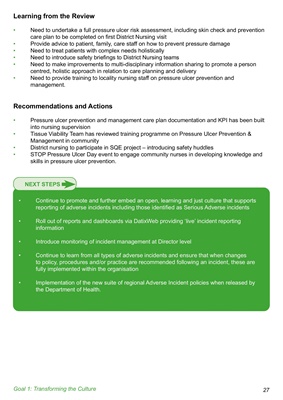
Learning from the Review
• Need to undertake a full pressure ulcer risk assessment, including skin check and prevention
care plan to be completed on first District Nursing visit
• Provide advice to patient, family, care staff on how to prevent pressure damage
• Need to treat patients with complex needs holistically
• Need to introduce safety briefings to District Nursing teams
• Need to make improvements to multi-disciplinary information sharing to promote a person
centred, holistic approach in relation to care planning and delivery
• Need to provide training to locality nursing staff on pressure ulcer prevention and
management.
Recommendations and Actions
• Pressure ulcer prevention and management care plan documentation and KPI has been built
into nursing supervision
• Tissue Viability Team has reviewed training programme on Pressure Ulcer Prevention &
Management in community
• District nursing to participate in SQE project - introducing safety huddles
• STOP Pressure Ulcer Day event to engage community nurses in developing knowledge and
skills in pressure ulcer prevention.
• Continue to promote and further embed an open, learning and just culture that supports
reporting of adverse incidents including those identified as Serious Adverse incidents
• Roll out of reports and dashboards via DatixWeb providing 'live' incident reporting
information
• Introduce monitoring of incident management at Director level
• Continue to learn from all types of adverse incidents and ensure that when changes
to policy, procedures and/or practice are recommended following an incident, these are
fully implemented within the organisation
• Implementation of the new suite of regional Adverse Incident policies when released by
the Department of Health.
NEXT STEPS
Goal 1: Transforming the Culture 27